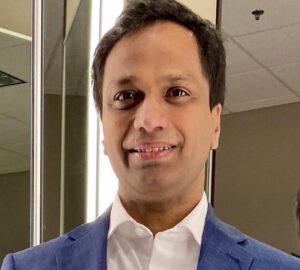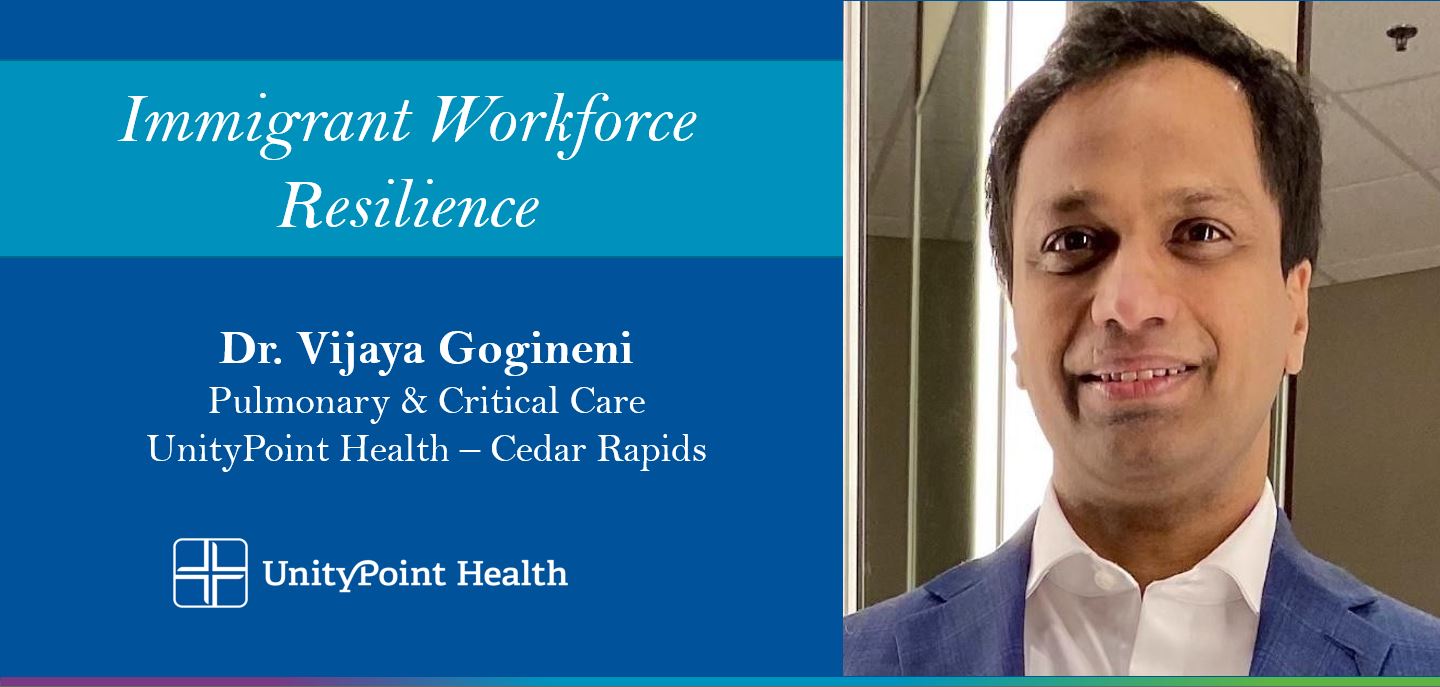UnityPoint Health employs more than 80 physicians on temporary visas waiting for green cards. These physicians are vital to our mission and communities. To remedy the administrative backlog of temporary visas, we strongly encourage the re-introduction and passage of Congressional proposals, like those from the 116th Congress – the Healthcare Workforce Resilience Act (S.3599 / H.R.6788) and the Conrad 30 Program and Physician Reauthorization Act (S.948/ H.R.2895). This is an important issue for all regions of UnityPoint Health – our hospitals, clinics and communities – and is part of our federal action list.
This is the second issue in our series highlighting different perspectives about this issue. Here is another personal story from one of our valued medical specialists:
Vijaya Gogineni, M.D. (Cedar Rapids, IA)

“I’m a Pulmonary and Critical Care physician. Since 2013, I have worked for St. Luke’s Cedar Rapids.
I received my medical training from Osmania Medical College in Hyderabad, India. I completed my Internal Medicine Residency at St. Mary’s Health Center in St. Louis, MO and my fellowship at Creighton University Medical Center in Omaha, NE.
Pulmonology really became my passion during my Internal Medicine residency years. The skills and knowledge of the excellent specialists at Creighton impressed me, and I became deeply interested in the physiology and structure of the human lung.
I really enjoy UnityPoint Health, St. Luke’s, and the Cedar Rapids community. My wife and I am enjoying raising our family here. The work environment is great and I’m very impressed with our overall quality of care. People here are very friendly, and our family has so many friends and strong relationships throughout the community. My son was born here; my daughter was just six months old when we came to Cedar Rapids.
At St. Luke’s, we’ve been seeing many, many COVID-19 patients. It was very busy this summer and during fall, we had significantly higher volume in the ICU than a normal year. During the second peak, in November, we had about 90 patients with COVID-19 in the hospital. I’m one of the first people in the ICU to see the sickest COVID-19 patients who need mechanical ventilation or are on high oxygen requirements. I certainly remain at a high risk of contracting the virus, and that’s stressful. I did get vaccinated with the Pfizer vaccine in January.
My appointment schedule in our clinic remains completely booked for the next six to seven months. I see a high volume of patients, which is not unusual for my specialty. But COVID definitely does add some strain to our normal amount of patient scheduling backlog.
It’s frustrating how much COVID has strained our ability to deploy physicians and healthcare providers across our system. For instance, our Marshalltown and Waterloo UnityPoint hospitals have very limited or no Critical Care/ICU physician availability. Because of my current work requirements and restrictions, it’s impossible for me to even provide respite relief for my colleagues in Marshalltown.
In February of 2012, I applied for permanent resident status; that June I received my first H-1b temporary visa. We get new temporary permits every 3 years so we can remain here and remain employed. At the USICS website, people can track their current visa status and projected time to permanent status. For everyone coming from India, my birth country, there is a long waiting period for anyone who wants to come to the U.S. to work. In the last seven years, I’ve only advanced on the list for permanent status the equivalent of a few months’ time.
What do I think Congress should do? I think the green card “cap” should be removed and the entire process should be expedited. At the current rate, I will not be granted a green card until 30 years from the time of my original application. If I don’t get it, ultimately, I would have to emigrate back to India. Along with other physicians, I have engaged in some past lobbying efforts, to push for the green card cap removal, so that unused green cards can be used for healthcare slots. Then much-needed physicians could remain in the U.S. with surety, advancing more quickly through the permanent immigration process.
Getting permanent resident status would give me a real sense of relief and solidity. I have a wife and two children. Without permanent visa status, if anything happened to me, my family would have to go back to India, as I would not be eligible for any disability benefits. When I do go back to India on even a short visit, I must go to the U.S. Embassy before returning. They could always reject my application, for a variety of reasons. Some of my friends back on trips have suddenly and without warning had to stay in India for an extra six to eight weeks before they are allowed to come back. So, working is more stressful, because these practical concerns are always with me.”
Some Key Statistics:
- 78 UnityPoint Health physicians are currently on H1B visa status.
- In 2019, more than 95,000 UnityPoint Clinic (UPC) visits occurred with these physicians, or about every 1 in 10 UPC visits that year.
- They practice in 12 medical specialties as well as in primary care (family medicine, internal medicine and pediatrics).
- These medical specialties include Anesthesiology, Cardiology, Emergency Medicine, Endocrinology, Hospitalist Care, Infectious Disease, Neurology, Obstetrics/Gynecology, Oncology, Pediatric Specialties, Pulmonology and Rheumatology.
- For COVID-19 care, these specialists serve in the critical areas of Pulmonology, Infectious Disease and Hospitalist care. They provided care for 39% of UPC Pulmonology visits in 2019 and 36% of Infectious Disease visits. More than 25 of our Hospitalists are currently on H1B visa status.
For more information about UnityPoint Health’s position, please contact:
- Stephanie Collingwood, Government Relations Specialist at [email protected]


